
The Development, Relief, and Education for Alien Minors Act, known as the DREAM Act, is a United States legislative proposal to grant temporary conditional residency, with the right to work, to undocumented immigrants who entered the United States as minors—and, if they later satisfy further qualifications, they would attain permanent residency.

Reyna Grande is a Mexican-American author.

Foreign nationals (aliens) can violate US immigration laws by entering the United States unlawfully or lawfully entering but then remaining after the expiration of their visas, parole, or temporary protected status. Illegal immigration has been a matter of intense debate in the United States since the 1980s.
Bambadjan Bamba is an Ivorian actor and filmmaker known for his roles in Black Panther, Suicide Squad, and The Good Place. He is also a prominent immigrant rights advocate.
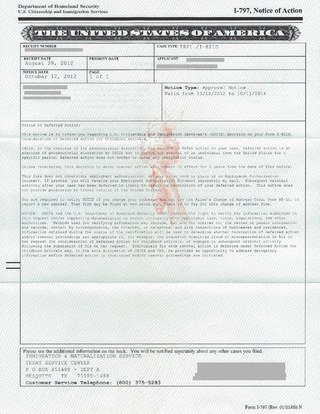
Deferred Action for Childhood Arrivals (DACA) is a United States immigration policy. It allows some individuals who, on June 15, 2012, were physically present in the United States with no lawful immigration status after having entered the country as children at least five years earlier, to receive a renewable two-year period of deferred action from deportation and to be eligible for an employment authorization document.

Yosimar Reyes is a Mexican-born poet and activist. He is a queer undocumented immigrant who was born in Guerrero, Mexico, and raised in East San Jose, California. Reyes has been described as "a voice that shines light on the issues affecting queer immigrants in the U.S. and throughout the world."
Undocumented youth in the United States are young people living in the United States without U.S. citizenship or other legal immigration status. An estimated 1.1 million undocumented minors resided in the U.S. as of 2010, making up 16% of the undocumented population of 11 million. Undocumented students face unique legal uncertainties and limitations within the United States educational system. They are sometimes called the 1.5 generation, as they have spent a majority of their lives in the United States.
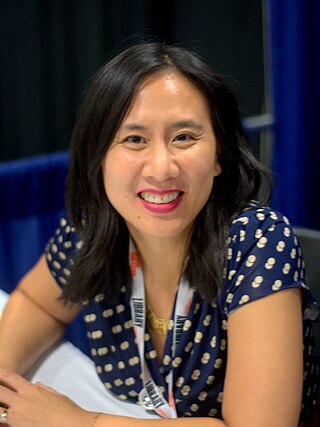
Celeste Ng is an American writer and novelist. She has released many short stories that have been published in a variety of literary journals. Ng's first novel, Everything I Never Told You, released on June 26, 2014, won the Amazon Book of the Year award as well as praise from critics. Ng's short story Girls at Play won a Pushcart Prize in 2012, and was a 2015 recipient of an Alex Award. Her second novel, Little Fires Everywhere, was published in 2017. The TV-miniseries based on the book premiered in 2020. Ng received a Guggenheim Fellowship in 2020. Her most recent novel, Our Missing Hearts, was released on October 4, 2022.
Maria Kuznetsova is a Ukrainian American novelist with two book publications, both from Random House.
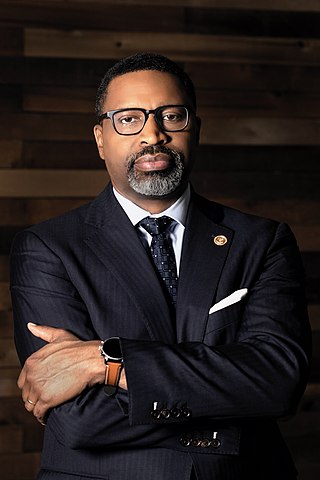
Derrick Johnson is an American lawyer and humanitarian. He serves as the 17th President and CEO of the NAACP. He had previously served as president of its Mississippi state chapter, and vice chairman of its board of directors. Johnson is the founder of the Mississippi nonprofit group One Voice Inc., which aims to improve quality of life for African Americans through public engagement.
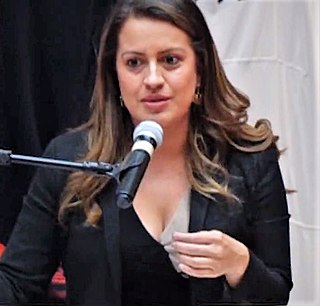
Catalina Cruz is a Colombian-American attorney from the borough of Queens in New York City. A member of the Democratic Party and former undocumented immigrant minor (DREAMer), Cruz has worked as an advocate for immigration rights, including as Director of New York Governor Andrew Cuomo's 2016 Exploited Task Force. Cruz was elected as the Democratic candidate in the Fall 2018 election for the 39th district of the New York State Assembly, representing Corona, Elmhurst, and Jackson Heights, Queens.

Martyna Majok is a Polish-born American playwright who received the 2018 Pulitzer Prize for Drama for her play Cost of Living. She emigrated to the United States as a child and grew up in New Jersey. Majok studied playwriting at the Yale School of Drama and Juilliard School. Her plays are often politically engaged, feature dark humor, and experiment with structure and time.

Cristina Jiménez Moreta is an Ecuadoran immigration activist who co-founded United We Dream in 2008. In 2017, Jiménez Moreta was named a MacArthur Fellow and won the Freedom From Fear Award.
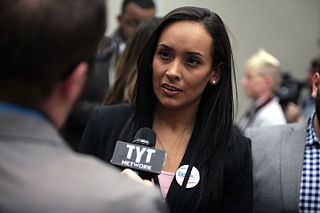
Erika Andiola is an immigration rights activist located in Metropolitan Phoenix. She is the Chief Advocacy Officer for the organization RAICES. Her previous political roles include Political Director for the organization Our Revolution, Press Secretary for Latino Outreach in Bernie Sanders’ 2016 campaign, and Congressional staffer for then-Representative Kyrsten Sinema. Much of Andiola's work has been driven by her own journey as an undocumented Mexican female immigrant.

Abigail Daniella Phillip is a CNN anchor and a senior political correspondent who anchors CNN NewsNight. She previously worked for Politico covering the Obama White House, The Washington Post as a national political reporter, and ABC News as a digital reporter for politics.
Wolf v. Vidal, 591 U.S. ___ (2020), was a case that was filed to challenge the Trump Administration's rescission of Deferred Action for Childhood Arrivals (DACA). Plaintiffs in the case are DACA recipients who argue that the rescission decision is unlawful under the Administrative Procedure Act and the Fifth Amendment. On February 13, 2018, Judge Garaufis in the Eastern District of New York addressed the question of whether the government offered a legally adequate reason for ending the DACA program. The court found that Defendants did not provide a legally adequate reason for ending the DACA program and that the decision to end DACA was arbitrary and capricious. Defendants have appealed the decision to the Second Circuit Court of Appeals.

Gisele Barreto Fetterman is a Brazilian-born American activist, philanthropist and nonprofit executive. She is a founder of the non-profit Freestore 15104 and a co-founder of the non-profits For Good PGH and 412 Food Rescue. She is married to Senator John Fetterman of Pennsylvania. During her husband's tenure as lieutenant governor, she was the second lady of Pennsylvania.
Greisa Martínez Rosas is a Mexican immigrant rights activist based in Dallas. She is executive director of the advocacy organization, United We Dream.
Grace Talusan is a Filipino American writer. Her 2019 memoir, The Body Papers, won the Restless Books Prize for New Immigrant Writing and the Massachusetts Book Award in nonfiction, and was a New York Times Editors' Choice selection. Her short story "The Book of Life and Death" was the Boston Book Festival's One City One Story selection in 2020.
United We Dream is a nonprofit immigrant advocacy organization with chapters operating in 28 U.S. states. The organization is an "immigrant-youth-led network" of 400,000 members in 100 local groups. The group was involved in advocacy surrounding the passing of the Deferred Action for Childhood Arrivals (DACA) bill.













